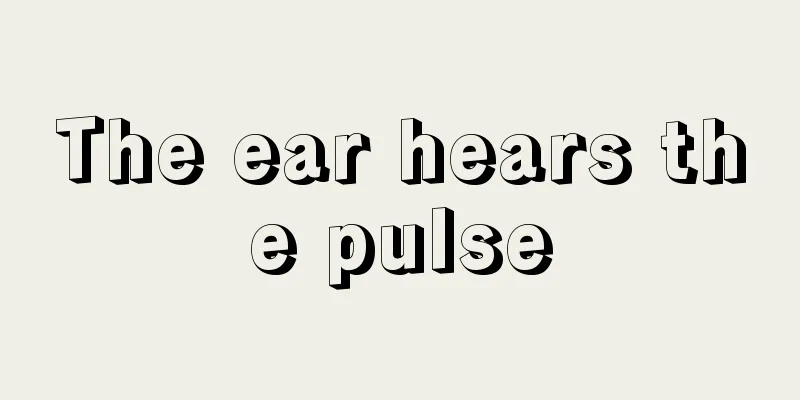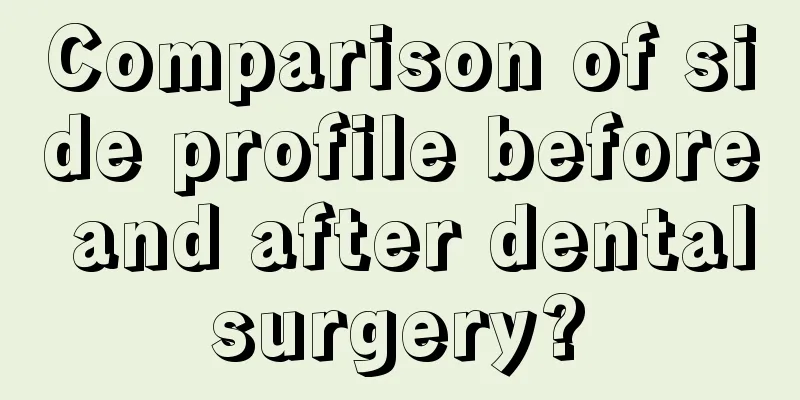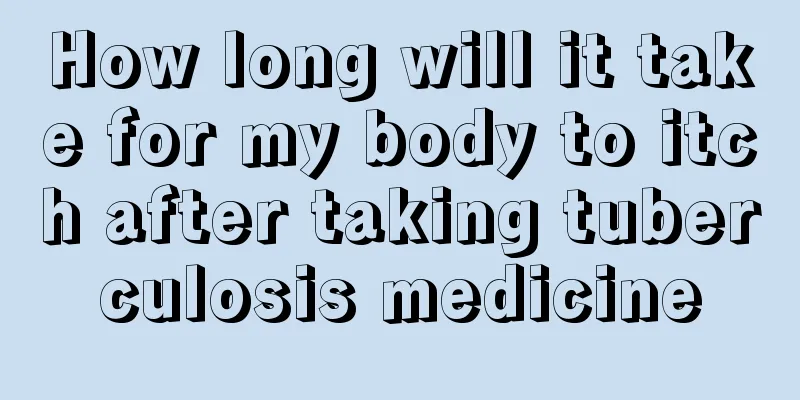Wisdom tooth half grown and covered by flesh

|
A person's back molars are mainly used to chew and grind food to make it easier for the digestive system to digest it. Before adulthood, a person generally has only two back molars. After adulthood, additional back molars will grow, which are wisdom teeth. However, since wisdom teeth do not develop well from the beginning like other teeth, most wisdom teeth do not develop very well, especially in the early stages of development, when wisdom teeth have not fully grown out and are covered by flesh. What should we do at this time? 1. What should I do if my wisdom tooth is half-grown and covered by flesh? Wisdom tooth refers to the third molar on the innermost alveolar bone in the human mouth, which is exactly the eighth tooth counting from the central incisor. Because it erupts very late, generally between the ages of 16 and 25, when a person's physical and psychological development are close to maturity, it symbolizes the "arrival of wisdom" and is therefore commonly called "wisdom tooth." There are great differences between individuals in the growth of wisdom teeth. Normally, there should be four teeth that are symmetrical in the upper and lower left and right directions. Some people have less than four or even none, and very few people have more than four. The age difference of eruption is also very large. For some people, it erupts before the age of 20, some people erupt at the age of 40 or 50, or never erupt in their lifetime. This is all normal. The wisdom tooth is half grown, and the other half is covered by the flesh, which is very painful. Generally speaking, abnormal eruption position of wisdom teeth can cause pain and may cause discomfort to the front teeth. It is recommended to go to the oral department of the hospital to check the condition of the teeth and consider removing them to avoid affecting the front teeth. Due to incomplete eruption of wisdom teeth, part of the crown is surrounded by the gums, forming a blind pocket, which makes it easy for food residues to enter but difficult to exit, leading to redness and swelling of the pericoronal soft tissue and pus accumulation in the blind pocket. The patient will have symptoms such as pain, difficulty opening the mouth, and fever. 2. Risks of wisdom teeth 1. Due to incomplete eruption of wisdom teeth, part of the crown is surrounded by the gums, forming a blind pocket. Food residues are easy to enter but difficult to exit, resulting in redness and swelling of the pericoronal soft tissue and pus accumulation in the blind pocket. The patient will have symptoms such as pain, difficulty opening the mouth, and fever. 2. When wisdom teeth grow, the eruption position is often insufficient, which may lead to incomplete eruption, ectopic or impacted wisdom teeth, with part of the crown exposed outside the gums and part covered by the gums. 3. When the body's resistance decreases and the virulence of bacteria increases, it can cause inflammation of the tissues around the crown. In the early stages of pericoronitis of wisdom teeth, the symptoms are mild and are often ignored by patients, leading to delayed treatment, which causes the inflammation to develop rapidly and the condition to worsen. 4. Wisdom teeth are the third largest molars and have an important impact on the adjacent second molars. Since most wisdom teeth are impacted and tilted forward, they press on the second molar at an angle of about 45 degrees, forming a crown angle that makes it easy for food to get stuck. Over time, this can lead to caries of the second molar or even pulpitis. Even if it is not that serious, it can affect the lifespan of the second molar. Therefore, it is recommended to preventively extract abnormal or asymmetrically erupted wisdom teeth as early as possible. 3. Details of Wisdom Teeth Treatment Treatment Details: 1. Anti-inflammatory. You need to reduce inflammation first, take some medicine, and rinse your mouth with mouthwash or light salt water. 2. Pay attention to your diet. Don't eat spicy food, seafood, eggs or other fat-producing foods. Vegetables and fruits are of course fine, and a little lean meat is okay. 3. Treatment. The jawbone that accommodates the teeth continues to degenerate and become smaller, so impacted wisdom teeth are an inevitable result. The removal of impacted wisdom teeth has no adverse effects on chewing, language and other functions. In addition, removal is the most effective way to treat impacted wisdom teeth. Therefore, it is recommended to remove impacted wisdom teeth that cause the above-mentioned hazards as early as possible and decisively. 4. Retention The wisdom teeth are in a relatively correct position, have erupted normally or are expected to erupt normally and have an occlusal relationship. There was no history of inflammation or pain in the soft tissue around the wisdom teeth, and there was no caries in the wisdom teeth. There are wisdom teeth that are opposite to the teeth. Impacted teeth that are completely embedded in the bone can be temporarily retained if they are not connected to the periodontium of adjacent teeth and do not compress nerves to cause pain. Therefore, it is recommended to preventively extract abnormal or asymmetrically erupted wisdom teeth as early as possible. 4. How to care for wisdom teeth 1. After wisdom teeth are extracted, there will generally be swelling, especially around the third day after the extraction, when the swelling will be the most severe, and then the swelling will slowly subside. 2. Generally, you should not rinse your mouth or brush your teeth within 24 hours after having your wisdom teeth removed. If you rush to rinse your mouth and brush your teeth, you may rinse out the blood clot and prolong the healing time. You should also be careful not to lick the wound with your tongue frequently or suck it hard to prevent wound damage and infection, or cause the blood clots on the wound to fall off, affecting the coagulation process and causing continuous bleeding. 3. You can eat two hours after wisdom tooth extraction, but you should be careful to eat liquid food. Do not drink hot water or eat too hot or hard food. 4. Do not smoke for several days after having your wisdom teeth removed, because cigarette smoke can cause harmful stimulation to the extraction wound and affect the blood coagulation process. Do not drink alcohol or eat spicy or other irritating foods to avoid aggravating pain or bleeding. 5. Do not participate in strenuous exercise, do not talk or laugh loudly, and do not lick with your tongue. 6. If inflammation occurs, you can gargle alternately with hydrogen peroxide and salt water or take medication prescribed by a doctor. 7. Follow your doctor’s advice. |
<<: Can wisdom teeth be extracted from both sides at the same time?
>>: Can I have my wisdom teeth removed in the afternoon?
Recommend
What gas can be dried with concentrated sulfuric acid
Concentrated sulfuric acid is a strong acid and c...
What to do if toothache medicine doesn't work
Toothache can be said to be a very common discomf...
What is the Yaoyu bath recipe?
Nowadays, people are paying more and more attenti...
Can blood routine tests reveal anemia?
Nowadays, physical health is the most important t...
What is the difference between vitamin b1 and b2
There are many types of vitamins in the human bod...
Can I eat sweet potatoes during menstruation?
The menstrual period is a relatively important pe...
Is a broken rib serious?
A rib is broken, which is a common rib fracture. ...
Swelling and pain on both sides of the lower abdomen
There is bloating and pain on both sides of the l...
What are the emergency measures to relieve stomach pain
In life, without any reason, the symptoms of stom...
Are cecal polyps serious?
The appendix is very prone to inflammation. If ...
How does TCM treat prostate cancer based on syndrome differentiation?
Traditional Chinese medicine has a great effect o...
What are the diagnostic methods for lung cancer? Summary of 7 diagnostic methods for lung cancer
Lung cancer is a disease with a high mortality ra...
What are the ways to prevent bladder cancer?
In recent years, bladder cancer has become a majo...
Boil honeysuckle and bitter melon in water for bathing
Honeysuckle and bitter melon are both plants that...
What causes tooth decay?
If the teeth show symptoms of caries, when the di...









